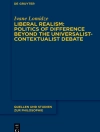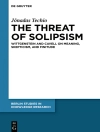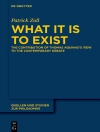Mục lục
Table of Contents
Acknowledgements
Introduction
1. Structure of the work
2. The Argument
2.1. Philosophical Eros and Will-to-Power: Tyranny and Tragedy
2.2. Philosophical Eros and the Other: The Will to Knowledge and the Instrumentalization of the Other
2.3. A Defence of Plato: Philosophical Eros and the Vindication of Philosophy
Wholeness, Tragedy and the Hubris of Philosophy: The Speech of Aristophanes and the first Indictment of Philosophy
1. Introducing Aristophanes
1.1. Background and Political Affiliations
1.2. Aristophanes and Plato: The Clouds of Aristophanes
2. The Speech of Aristophanes
2.1. Aristophanes Tragic Myth
2.2. Rebellion, Punishment, Re-orientation
2.3. Philosophy and Poetry
2.4. Naming Eros: The Threat of Nihilism
2.5. Eros Turranos and Eros Ouranos: Two Erotes or One?
3. Eros, Politics and Philosophy
Defending Philosophy I: Nietzsche’s Will-to-Power and Philosophy as Creative Excess
1. The Problem of Nietzsche and Socrates
1.1. Introducing Nietzsche
1.2. The Problem of Nietzsche
1.3. Nietzsche, Socrates, Plato
2. Philosophy as Spiritual Sovereignty
2.1. Philosophy in the Birth of Tragedy
2.2. Revolutions in Nietzsche’s Thought: Re-evaluating the Need for Justification
2.3. The ‘Yes’ and the ‘No’ to Life: Vitalism, Eros and Will-To-Power
2.4. Cultural Critique and the Transvaluation of Values
3. The Place of Socrates in the Later Thought of Nietzsche
3.1. Socrates as Cultural Critic
3.2. Philosophical Eros: Philosophy as Refined Will-To-Power
3.3. The Turn to Philosophy: Philosophy in the Tragic Age of the Greeks
3.4. The Later Works and Affirmation as Self-affirmation
3.5. Platonic Eros and Will-To-Power
3.6. Overthrowing the Gods and Dionysian Chaos
3.7. Tension in Affirmation: Ambition and the Hidden Goal of Eros
4. Defending and Overcoming Socrates: Nietzsche as the Fulfilment of an Aristophanic Prophesy
The Inhumanity of Philosophical Eros: The Speech of Alcibiades and the Second Indictment of Philosophy
1. Alcibiades: By Way of Introduction
1.1. Alcibiades the Man
1.2. Alcibiades and Socrates
1.3. Alcibiades and the Symposium
2. A Reading of the Speech of Alcibiades
2.1. The Beginning: Alcibiades Arrives
2.2. Introducing the Speech: Rival Visions of Eros and Language
2.3. Portrait of a Strange Man: Socrates in Images
2.4. Socratic Dualism and an Initial Accusation of Ethical Indifference
2.5. Sex and Philosophy: Ascent of the Soul and Descent of the Body
2.6. Socrates and the Cardinal Virtues
3. Canonical Readings of the Text
3.1. Gregory Vlastos: Plato’s Ethical Blindspot
3.2. Martha Nussbaum: Plato’s Recognition of the Inhumanity of Socrates
4. In Conclusion: Philosophical Eros, Dualism and Otherness
Defending Philosophy 2:
Desire and Dualism as the Prerequisites of Ethics in the Early Thought of Emmanuel Lévinas
1. Lévinas: By Way of Introduction
1.1. Lévinas and the Indictment of the Western Tradition
1.2. Lévinas, Alcibiades and Plato
2. Ethics as First Philosophy
2.1. The Same (Le Même) and the Other (l’Autrui): Lévinas and Phenomenology
2.2. The Fundamental Structures of Ethics
3. Lévinasian Being: The Elemental, Sensibility and Il y a
3.1. Enjoyment and the Same (Le Même): Need and Living From the Elements
4. Eros and Ethics in the Early Lévinas
4.1. Re-interpreting Plato’s Erotic Lack: Eros and the Early Works
4.2. Ambiguity, Dualism and the Relegation of Eros: Eros in Totality and Infinity
5. Conclusions Based on the Early Work
Ethics and Erotic Paradigms in the Later Lévinas: Towards a Redemption of Philosophy
1. A Critique of Lévinas: Ontology, Chronology, Methodology
1.1. Derrida’s Critique
1.2. A Phenomenological Paradox: Fundamental Ethics and the Pre-Ethical
2. Otherwise than Being: Ethics and the Sensual
3. Focal Points: Delineations of Subjectivity and Erotic Paradigms in Otherwise than Being
3.1. Subjectivity and Alterity: An-archy and Gift
3.2. The Erotic Paradigm Deepens: Proximity and Distance
3.3. Substitution: The One for the Other and the De-centring of the Subject
3.4. The Saying and the Said: Philosophy and Justice
4. Concluding Remarks and Problems: Leaving Lévinas
4.1. Eros, Philosophy and Ethics
4.2. The il y a and the Meaning of Being: Dualism
4.3. Self-Abnegation and Violence in the Unfolding of the Good
The Speech of Socrates: Ultimate Good, Relative Goods and the Hermeneutics of Eros
1. Initial Manoeuvres: Lack and Divine Origins
1.1. A Dialogic Interlude: The Deficiency and Lack of Eros
1.2. Diotima’s First Lesson: Eros as Metaxu
1.3. Diotima’s Second Lesson: The Origin of Eros: Metaxu and Doubleness
2. Transforming Eros: Empowerment and Creativity
2.1. Transitional Language and the Ambiguity of Erotic Desire for the Good
2.2. Forms of Erotic Transcending: Power and the Excess of Self
3. Hermeneutic Eros and the Final Ascent: Vindicating Philosophy
3.1. Hermeneutic and Heuristic Identifications of Ultimacy
3.2. Birth in Beauty Revisited: Eros as Spontaneous, Generous, Joyful
4. The Indictment One Last Time
4.1. Aristophanes
4.2. Nietzsche
4.3. Alcibiades
4.4. Lévinas
Appendix: The doctrine of eros in the Phaedrus
1. Eros in the Phaedrus
2. Dating and themes of the Phaedrus
3. The action of the dialogue
3.1. Prologue
3.2. The speech of Lysias and the first speech of Socrates
3.3. Interlude
4. The second speech of Socrates
4.1. Madness, inspiration, and reason
4.2. Affectivity and aesthetics
4.3. Eros and intersubjectivity
Bibliography
1. Plato: Primary Works
2. Other Primary Works
2.1. Lévinas
2.2. Nietzsche
3. Plato: Secondary Works
4. Other Secondary Works
4.1. Lévinas
4.2. Nietzsche
5. General bibliography












